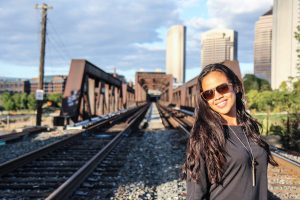8 Thoughts After 8 Years Without a Drink
By Deanna deBara 02/02/18
It wasn’t until I accepted that things had changed – and, in fact, that everything in my life would continue to change – that I was able to let go and move on.
A smiling woman in front of a train track.
A reflection on lessons learned over 8 years of sobriety, plus a little advice. Photo by Kelvin Quarles on Unsplash
December 30, 2009 was the day of my last bender. And that means that New Year’s Eve, December 31, 2017, marked eight years without a drink. At this point, I’ve been alcohol-free longer than I drank.
The past eight years have been a lot of things: exciting, challenging, awe-inspiring, frustrating, transformative. And over the past eight years, I’ve learned a few things: about myself, about life, and about how to navigate both without a drink in my hand.
Here are eight thoughts I have after eight years without a drink:
1. Recovery takes time.
Like most people, on day one of my sobriety, my life looked like a tornado had blown through it.
But for some reason, I thought the simple act of putting down the bottle would solve all of my problems. Like sobriety was a magic wand that would immediately repair all the damage I’d caused in my life.
Yeah… not so much.
I didn’t wake up to a brand new life on day two of my sobriety. The wreckage caused by my drinking wasn’t magically tidied up in the first day (or month, or even year) of my sobriety. Recovery doesn’t happen overnight.
Recovery takes time.
Quitting drinking (or smoking or snorting or whatever it is you’re into) is just the first step in the recovery process. Letting go of substances allowed me to tackle my problems with a clear and sober mind, but it certainly wasn’t a cure-all. I still had to put in the work to clean up the mess my addiction left in its wake.
But recovery is a tricky thing. At first, it seemed like nothing was happening. I felt like I was putting in work every day to better my life and not much was changing. But then all of a sudden, one day I woke up and my life wasn’t a mess. It’s like the John Greene quote – “I fell in love the way you fall asleep: slowly, and then all at once.”
Recovery takes time. But it’s time well spent.
2. The only thing holding you back is… well, you.
I spent a lot of time in my addiction and early recovery feeling stuck. I thought that the story of my life was already written and that there wasn’t much I could do to change things. And, as a result, I never took any risks. I followed the status quo. I would daydream of the kind of life I wanted to have – a life full of adventure – but it felt completely out of reach.
But then, a few years into my recovery, I realized that not taking risks was actually making me more unhappy than I would be if I took those risks and failed miserably. So I started trying more things. And the more I put myself out there and tried things that were uncomfortable, the more I realized the only thing holding me back was… well, myself.
Once I was able to let go of my fear and realize that I could (within reason) do anything I wanted, things changed. I ran a marathon. I started a business. I backpacked for three months through Southeast Asia.
Some risks worked out beautifully. Some crashed and burned. But when I got out of my own way and realized that the only thing holding me back from living the life I dreamed of was myself, everything changed.
3. You will probably look back at your early recovery and cringe.
Every time I look at a photo of myself from my first year of sobriety, I visibly cringe.
I wore graphic tees with obnoxious sayings like “Born To Be Wild” and “You Can’t Handle This.” I wore large, sparkly hoop earrings and went tanning every day. I smoked Newport 100s, drank at least two cans of Red Bull a day, and, judging by my track record, it seems my only dating criteria was “must have tattoos and a complete inability to smile for the camera.”
Thank god recovery is a growth process.
4. Being in recovery isn’t as big a deal as you think it is.
When I first stopped drinking, I had a lot of shame. I thought that being in recovery was a huge deal and set me apart from other, “normal” people. But the longer I’ve been alcohol free, the more I realize it’s actually not that big of a deal.
Pretty much everyone I’ve met has been touched by addiction in some way. If they personally haven’t struggled, they most likely have a father or sister or cousin or friend who has. And most people are actually really supportive and non-judgemental when you tell them you’re in recovery.
And if they’re not? That’s their problem, not mine.
5. Embrace the impermanence.
I have a tendency to cling to things. But if there’s anything I’ve learned in recovery, it’s that everything changes. And if you try to hold on to things as they are, you never give yourself the chance for things to grow into what they’re supposed to be.
This was one of the hardest lessons I’ve had to learn over the past eight years. I had a very close friend in early sobriety. We went through sober living together and were inseparable. He, to this day, is one of the best friends I’ve ever had.
One day, we were driving in his car, and he said “You know, Deanna, one day we’re not going to be as close as this.” And I remember brushing him off. Of course we would be! He was my best friend. Why would things ever change?
But, of course, he was right. He started dating a woman (who would later become his wife) and we slowly drifted apart. At first, I fought tooth and nail for things to stay the same. And I dealt with a lot of pain and anguish as a result. It wasn’t until I accepted that things had changed – and, in fact, that everything in my life would continue to change – that I was able to let go and move on.
In the past eight years, friendships have come and gone. Relationships have ended. I’ve changed jobs, apartments, and cities. And letting go has almost always been a challenge.
But everything in life is constantly changing. And I’ve learned that embracing the impermanence – instead of fighting it – makes life a lot less painful.
6. Energy drinks are terrible for you.
It took me chugging waaaay too many Red Bulls and Monster Rehabs at meetings and sober dances to learn this lesson, but lesson learned: energy drinks are horrible for you.
Seriously. They’re the worst. Stop drinking them.
7. Sometimes, the things you want most don’t work out (at least not the way you expect them to).
My lifelong dream for as long as I can remember was to be a full-time traveler. There was nothing more appealing to me than bouncing from country to country, living the digital nomad lifestyle.
And in 2016, I made that dream come true. I sold all my stuff, put everything I owned into a backpack, and set out to explore the world indefinitely.
I thought I’d live on the road forever. In reality, I made it four months before I came home.
The truth was, my dream of full-time travel and the reality of full-time travel were two completely different things. And in reality, full-time travel wasn’t the right fit for me. I missed having my own bed. I missed my friends and family. I missed the stability of my daily routine.
I wanted full-time travel to be the right fit for me more than I’d ever wanted anything in my entire life. But it wasn’t. And the lesson I learned is that sometimes, the things you want most don’t work out – at least not the way you expect them to.
At first, I looked at my foray into full-time travel as a failure. But as time passed, I changed my perspective. I fulfilled a lifelong dream. I did something I’d always wanted to do, and while it didn’t work out exactly as I’d expected, it still gave me some of the most amazing memories and experiences of my life. And it also gave me insight into the kind of life I did want.
Today, I still travel a ton (in fact, I’m writing this from a cabin in Lake Tahoe, where I’m staying for a month). But I also have a home base that gives me the sense of stability I craved when I was on the road. And it’s the perfect balance for me.
The point is, things might not work out the way I want them to – but they always work out the way they’re supposed to.
8. Recovery is different for everyone.
When I first stopped drinking, I had a very rigid view of recovery. I thought you could only be in recovery if you went to 12-step meetings every day and had a sponsor and worked the steps and all that jazz.
But as I progressed in my recovery (and left my 12-step program), I learned that recovery is different for everyone, and – more importantly – it wasn’t my place to judge anyone else’s path to healing. We all have different journeys, and no one is better than the other.
I’ve learned a lot in my eight years without alcohol. And I hope to learn a lot more. So here’s to the next eight.


